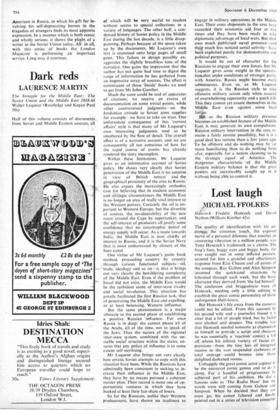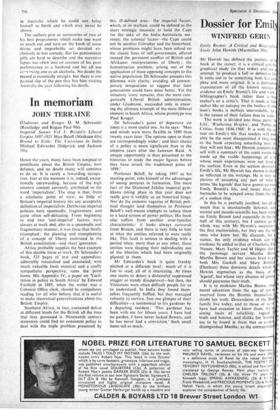Lost laugh
MICHAEL FFOLKES
Hancock Freddie Hancock and David Nathan (William Kimber 42s)
The quality of identification with his au- dienge, the common touch, the exposed
nerve of a personal dilemma that touches an
answering vibration in a million people, was . Tony Hancock's trademark as a clown. The frog's face, baggy eyes and baggy body, for
ever caught out in some inflated posture. secured for him a grateful and affectionate response from East Cheam and all points of the compass. Ray Galton and Alan Simpson invented the quicksand situations he laboured through each week, but the basic character they derived from 'the lad himself . The confusion and braggadocio were all Hancock, needing only a little editing to establish the great comic personality of those unforgotten Half-hours.
But Hancock's life away from the cameras could not be edited. From this account by his second wife and a journalist friend it is clear that a lot of people tried, but he faded into alcohol and despair. The trouble was that Hancock needed someone as chameleon as himself to provide a script and (because he was essentially a 'reaction' comic) a foil off whom his infinite variety of facial ex- pressions—from the tiny leer of imagined success to the vast suspended eyebrows of total outrage—could bounce into those delighted darkened rooms.
Unhappily the great comic actor aspired to be the universal comic genius and to do it alone. For a handful of programmes he achieved part of his ambition. He did a famous solo as 'The Radio Ham' but the words were still coming from Galton and Simpson. When he decided that they too must go, his career faltered and finally petered out in a series of television comedies
in Australia which he could not bring himself to finish and which may never be shown.
The authors give us summaries of two of his best programmes which make one want to reach out and turn on the knob of some divine and improbable set devoted ex- clusively to lost comedy. But his pantomimic gifts are hard to describe and the narrative lapses too often into an account of his poor performance as a husband and his all too co-Oncing one as an alcoholic. No doubt the record is essentially straight, but there is one painful slip of the pen that has him visiting Australia the year following his death.







































 Previous page
Previous page